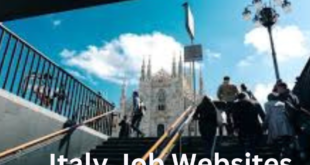Italy is a country with a rich history, culture, and economy that has been attracting people from all over the world for centuries. With its beautiful landscapes, delicious cuisine, and world-renowned fashion and design industry, Italy is a popular destination for tourists and expats alike. However, it is also a great place to work, with a variety of job opportunities available in different sectors.
If you are considering a career move to Italy, it is important to understand the job market and working culture in the country. While Italy has a high unemployment rate, there are still many job openings in certain industries, such as tourism, fashion, and design. Additionally, knowing the legal aspects of working in Italy, such as obtaining a work visa and registering with the tax authorities, is crucial for a successful transition.
Navigating the job market in Italy can be challenging, but with the right preparation and knowledge, it can also be a rewarding experience. This article will provide an overview of the job opportunities available in Italy, as well as tips for understanding the Italian job market, navigating the legal aspects of working in the country, and adapting to the working culture. Whether you are a recent graduate, an experienced professional, or an entrepreneur looking for new opportunities, this guide will help you make an informed decision about your next career move.
Key Takeaways
- Italy offers a variety of job opportunities in different sectors, such as tourism, fashion, and design.
- Understanding the Italian job market and legal aspects of working in the country is crucial for a successful transition.
- Adapting to the working culture in Italy can be challenging, but with the right preparation, it can also be a rewarding experience.
Why Choose Italy for Your Next Career Move
Italy is a country that offers a lot of opportunities for those looking to advance their careers. With a rich history and culture, Italy has a lot to offer both professionally and personally. Here are some reasons why you should consider Italy for your next career move:
Thriving Commercial Sector
Italy has a thriving commercial sector, with many internationally recognized companies based in the country. From fashion to food, Italy is home to some of the world’s most famous brands. The country’s economy is diverse, with a range of industries providing a variety of job opportunities. This means that no matter what your skills and experience, you are likely to find a job that suits you in Italy.
High Quality of Life
Italy is known for its high quality of life. The country is home to beautiful cities, stunning countryside, and a rich cultural heritage. The food and wine are world-renowned, and there are plenty of opportunities to enjoy the country’s natural beauty. The Italian lifestyle is relaxed and social, making it a great place to live and work.
Multilingual Environment
Italy is a multilingual country, with many people speaking English as well as Italian. This makes it an ideal destination for those looking to work in an international environment. With many multinational companies based in Italy, there are plenty of opportunities to work with people from all over the world.
Competitive Salaries
Salaries in Italy are competitive, with many companies offering generous packages to attract the best talent. The cost of living is also lower than in many other European countries, meaning that your salary will go further.
Easy Access to Other European Countries
Italy is located in the heart of Europe, making it easy to travel to other countries for work or leisure. The country has excellent transport links, including an extensive rail network and several international airports.
In summary, Italy offers a range of opportunities for those looking to advance their careers. With a thriving commercial sector, high quality of life, multilingual environment, competitive salaries, and easy access to other European countries, Italy is an excellent destination for anyone looking to take their career to the next level.
Understanding the Italian Job Market
Italy is a country with a diverse economy that provides plenty of job opportunities for both domestic and foreign workers. Understanding the Italian job market is crucial for anyone interested in pursuing a career in this country.
Current Trends
The Italian job market has been recovering from the economic crisis of the past few years. The unemployment rate has been decreasing, and the number of job openings has been increasing. However, the job market is still highly competitive, and the demand for skilled workers is higher than for unskilled workers.
Key Industries
Italy has a diverse economy, and there are many industries that provide job opportunities. Some of the key industries in Italy include:
- Tourism
- Fashion and design
- Automotive
- Food and wine
- Information technology
Major Cities for Employment
The major cities in Italy offer the most job opportunities. Some of the top cities for employment in Italy include:
- Milan
- Rome
- Turin
- Florence
- Naples
Milan is known as the economic capital of Italy, and it is home to many multinational companies. Rome is the political capital of Italy, and it is a hub for the tourism industry. Turin is known for its automotive industry, while Florence is known for its fashion and design industry. Naples is a major city in the south of Italy and is known for its food and wine industry.
Overall, the Italian job market provides many opportunities for workers in a variety of industries. However, competition for jobs is high, and it is important to have the necessary skills and qualifications to succeed in this market.
Navigating Job Opportunities in Italy
Finding job opportunities in Italy can be challenging, but there are several ways to navigate the job market. Here are some options to consider:
Job Search Platforms
There are several job search platforms available in Italy, including Indeed, Monster, and LinkedIn. These platforms allow job seekers to search for jobs by location, industry, and experience level. They also provide information about the companies and the application process.
Networking Opportunities
Networking is an essential part of finding a job in Italy. Attending industry events, job fairs, and professional conferences can help job seekers connect with potential employers and learn about job opportunities. Joining professional associations and social clubs can also be helpful in expanding one’s network.
Recruitment Agencies
Recruitment agencies can be a valuable resource for job seekers, particularly those who are looking for specialized or high-level positions. These agencies have access to job openings that may not be advertised publicly, and they can help job seekers navigate the application process and negotiate job offers.
Overall, job seekers in Italy should be proactive and persistent in their job search. By utilizing job search platforms, networking opportunities, and recruitment agencies, they can increase their chances of finding the right job for their career goals.
Working Culture in Italy
Italy is a country that values work, but also places a high importance on enjoying life. This is reflected in the working culture, which can differ from what you may be used to in other countries.
Work-Life Balance
Italians work hard, but they also prioritize their personal lives. This means that work-life balance is an important aspect of the working culture in Italy. It is not uncommon for businesses to close in the middle of the day for a few hours so that employees can go home and have lunch with their families. Additionally, many businesses close early on Fridays to allow employees to start their weekends early.
Italian Business Etiquette
When it comes to business etiquette, Italians value personal relationships and trust. It is important to take the time to get to know your colleagues and clients on a personal level before jumping into business discussions. Italians also tend to be very expressive and passionate, so it is not uncommon for conversations to become animated.
In terms of dress code, Italians tend to dress formally for business meetings. Men should wear a suit and tie, while women should wear business attire. It is also important to arrive on time for meetings, as punctuality is highly valued in Italian business culture.
Overall, working in Italy can be a rewarding experience, but it is important to understand and respect the working culture. By prioritizing work-life balance and building personal relationships, you can succeed in the Italian business world.
Legal Aspects of Working in Italy
Italy has strict laws governing employment, and it is important for foreign nationals to understand the legal aspects of working in the country. This section outlines the key legal requirements for obtaining a work permit and visa, and the employment laws that govern working in Italy.
Work Permits and Visas
Foreign nationals who wish to work in Italy must obtain a work permit and visa. The process for obtaining these documents can be complex and time-consuming, and it is advisable to seek the assistance of an immigration lawyer or consultant.
There are several types of work permits available in Italy, including:
- Blue Card: for highly skilled workers
- Seasonal Work Permit: for seasonal workers in agriculture and tourism
- Self-Employment Visa: for entrepreneurs and self-employed individuals
- Family Reunification Visa: for family members of Italian citizens or residents
In addition to obtaining a work permit, foreign nationals must also obtain a visa that allows them to enter and stay in Italy for the duration of their employment. The type of visa required will depend on the length of stay and the purpose of the visit.
Employment Laws
Employment laws in Italy are designed to protect workers’ rights and ensure fair treatment in the workplace. Some key employment laws include:
- Maximum working hours: 8 hours per day and 40 hours per week
- Minimum wage: currently €9.19 per hour
- Paid leave: 4 weeks per year
- Notice periods: 1-6 months depending on length of service
- Severance pay: 1/13th of annual salary for each year of service
Employers are also required to provide a safe working environment and adhere to health and safety regulations.
Foreign nationals working in Italy are entitled to the same employment rights and protections as Italian workers. It is important for both employers and employees to be aware of their rights and obligations under Italian employment law.
Living in Italy
Italy is a beautiful country with a rich history and culture. It offers a high quality of life, good food, and beautiful landscapes. However, before moving to Italy, it is important to consider the cost of living, accommodation, and healthcare.
Cost of Living
The cost of living in Italy can vary depending on the region. The most expensive cities are Rome and Milan, while the cost of living in smaller towns and rural areas is generally lower. The average monthly cost of living for a single person in Italy is around €1,200, which includes rent, food, and utilities.
Accommodation
Finding accommodation in Italy can be challenging, especially in the larger cities. The most common types of accommodation are apartments, which can range from small studios to large flats. The average monthly rent for a one-bedroom apartment in the city center is around €800-€1,200, while outside the city center, it can be as low as €500.
Healthcare
Italy has a public healthcare system that provides free or low-cost medical care to all citizens and residents. Foreigners who are legally resident in Italy are entitled to the same healthcare services as Italian citizens. However, it is recommended to have private health insurance, especially for non-emergency medical care.
Overall, living in Italy can be a great experience, but it is important to consider the cost of living, accommodation, and healthcare before making the move.
Conclusion
In conclusion, Italy offers a diverse range of job opportunities in the commercial sector. With its thriving economy and strategic location, the country has become a hub for international business, making it an attractive destination for professionals looking to further their careers.
While the Italian job market can be competitive, those who possess the necessary skills and experience will find ample opportunities to succeed. Whether it’s in sales, marketing, finance, or operations, there are plenty of roles available for ambitious individuals who are willing to put in the effort to succeed.
Furthermore, Italy’s rich cultural heritage and stunning landscapes make it an ideal place to live and work. From the bustling streets of Rome to the tranquil hills of Tuscany, there is something for everyone in this beautiful country.
Overall, for those seeking a new career move, Italy is an excellent option that should not be overlooked. With its vibrant business culture, diverse job opportunities, and unparalleled quality of life, it is a destination that is sure to provide both personal and professional fulfillment.
Frequently Asked Questions
What are some high demand jobs for foreigners in Italy?
There are several high demand jobs for foreigners in Italy. These include jobs in the fields of engineering, IT, healthcare, finance, and education. The demand for skilled professionals in these fields is high, and many companies are looking to hire foreign workers who have the necessary qualifications and experience.
What are some unskilled jobs available for foreigners in Italy?
Foreigners who do not have specific skills or qualifications may find it challenging to find work in Italy. However, there are some unskilled jobs available, such as working in the hospitality industry, agriculture, or as a language teacher.
What job opportunities are available for foreigners in Italy?
There are various job opportunities available for foreigners in Italy, depending on their qualifications and experience. Some of the most common job opportunities for foreigners include teaching English, working in the tourism industry, and working as an au pair.
What are some jobs in Italy that are suitable for English speakers?
English speakers may find it challenging to find jobs in Italy that do not require fluency in Italian. However, some jobs that are suitable for English speakers include teaching English as a foreign language, working in the tourism industry, and working for international companies that operate in Italy.
What are some seasonal jobs in Italy for English speakers?
There are several seasonal jobs available for English speakers in Italy, particularly during the summer months. These include working in the tourism industry, as a language teacher, or as a camp counselor.
What is the most in demand job in Italy?
The most in-demand job in Italy varies depending on the region and industry. However, some of the most in-demand jobs in Italy include software developers, nurses, engineers, and teachers.



